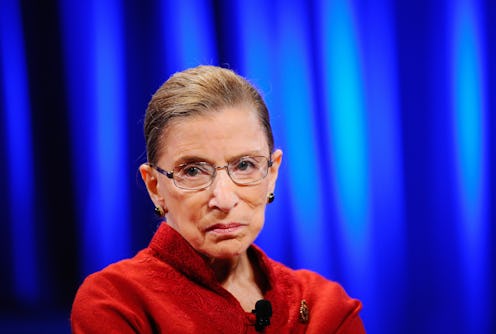News
Guess Who Didn't Like Ruth Bader Ginsburg
Supreme Court Justice Ruth Bader Ginsburg may be known as "The Notorious RBG" around these parts, but it seems like not everyone was down with the sharp, liberal justice prior to her appointment to the high court. In fact, one of her haters may have been a very beloved liberal. Previously unreleased documents reveal that the Clinton Administration didn't like Ruth Bader Ginsburg, outlining her so-called “performance pitfalls” in a White House memo. The memo, which was released on Friday in a batch of documents from the Clinton-era White House, was penned by a Clinton aid.
Dated July 13, 1993, the memo assesses Ginsburg's performance during her Senate confirmation hearing. Among the "performance pitfalls" then-White House Associate Counsel Ron Klain found were Ginsburg's "stalwart defense of the ACLU," her "hostility" toward the confirmation process, and "nitpicking" a question's premise rather than answering the question (to the growing annoyance of the senators).
Also, Ginsburg had some "style problems," though not of the sartorial kind:
And finally, Judge Ginsburg's technique — her failure to make eye contact, her halting speech, her 'laconic' nature (to use Jim Hamilton's phrase) — is not helpful.
The Ginsburg assessment ends with a (slightly over-)dramatic warning of how to deal with a hard-headed woman who's a thorn in the side of a man:
You should be cautious in dealing with her on these and other points. Judge Ginsburg views the White House's interest and her interests as being at odds with each other: she sees us as having a stake in presenting her as a moderate and in getting along well with the Senate; she sees her interests as "being herself," preserving her "dignity," and promoting her "independence." [emphasis the White House]
The newly released memo corroborates some things we already know about RBG — and no, not that she's particularly good at penning scathing dissents. Ginsburg has long been somewhat of a controversial figure on the Supreme Court, beginning in 1993 with her tumultuous Senate confirmation. Although she was embraced by liberals, there was concern that she was a little too liberal, especially for centrist Democrats like Bill Clinton.
Ginsburg's liberal leanings, however, shouldn't have come as a surprise to anyone. Her stances were firm, dating back to her tenure as a lawyer with the ACLU. While there, she became co-director of the ACLU's Women's Rights Project, and worked on advancing rights for women, including the right to safe and legal abortions and eradicating sex-discrimination in the workplace.
These issues were raised during her Senate confirmation hearings, with a spotlight turned to her strong defense of abortion rights. However, the Clinton-era White House noted other, more "radical" issues that Ginsburg and the ACLU defended, including a ban of the death penalty and the decriminalization of marijuana. "She has an instinct for defending some rather extreme liberal views on these questions," the memo said.
Despite what his aids believed, Clinton stood by Ginsburg during the summer of 1993, saying of her nomination: "Ruth Bader Ginsburg cannot be called a liberal or a conservative. She has proved herself too thoughtful for such labels."
You can read the full Clinton White House memo about Ruth Bader Ginsburg here.
Images: Getty Images (2)
